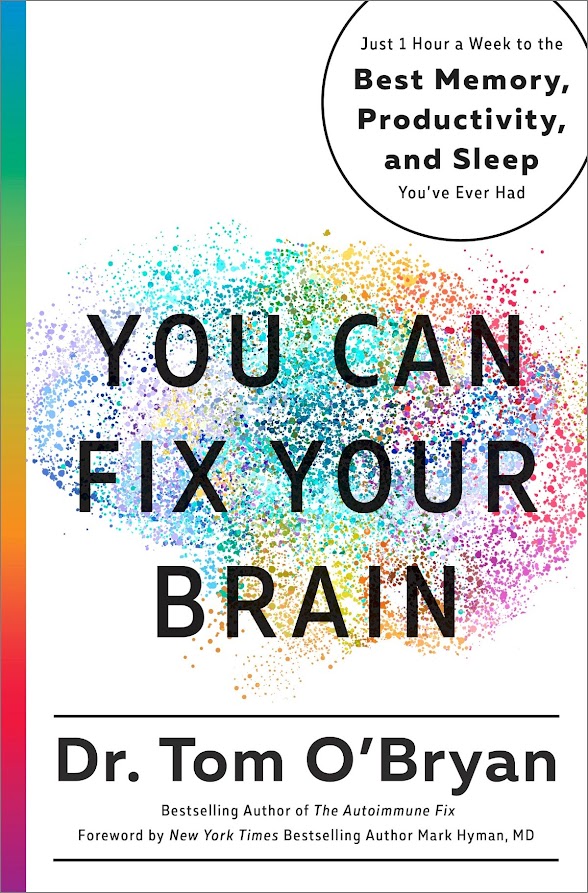You Can Restore Your Brain (2018) serves as a systematic handbook for enhancing cognitive function and overall brain health. Through dietary preferences, environmental adjustments, and other health rituals, you can diminish brain haze, amplify your recollection, and heighten your mental lucidity.
Commencement: Dispel the Fog and Elevate Your Brain
Do you encounter this scenario frequently? While attempting to complete a work assignment on your computer screen, it appears as though your ideas are navigating through a dense fog. Concentration seems unattainable.
Alternatively, have you experienced this? Engaged in a phone call, prepared to inscribe a crucial detail. You scurry to locate pen and paper – “Where did they vanish to again?” – however, by the time you retrieve them, the information to be jotted down has slipped your mind.
If you have encountered instances of brain fog or memory hiccups, rest assured, you are not alone. Countless individuals, regardless of age, grapple with cognitive symptoms and limitations that impede their standard of living and efficiency.
But here’s the optimistic viewpoint – there is undeniably room for improvement.
In this summary, we will dissect the fundamental causes of brain malfunction, often interconnected with inflammation, and the means to ascertain if they are impacting you. We will also grasp some tactics for combatting these issues through lifestyle adaptations and dietary alterations.
You hold the power to boost your cognitive capabilities and achieve superior memory, comprehension, and vitality. Let us commence on this journey.

Resistance, Inflammation, and the Brain
What links dementia, despondency, anxiousness, and memory decline? They all stem from unchecked cycles of inflammation and autoimmunity. Remarkably, all these conditions are amenable to treatment by identifying and eradicating the root triggers. Let’s delve into this process.
The primary role of the immune system is to safeguard your body from external substances – detrimental intruders encroaching on your system. An efficiently functioning immune system can differentiate between your body’s cells and external menaces, ensuring that only genuine threats are targeted.
However, what unfolds when this mechanism malfunctions? Autoimmunity transpires when the immune system misconstrues your healthy cells as invaders, inciting an assault on them.
This culminates in inflammation within the implicated cells and tissues and could even prompt your immune system to obliterate these cells presuming they are impaired.
So, where does this cascade initiate? It frequently commences due to the existence of alien substances, environmental pollutants, or foods to which you might bear an individual sensitivity, or which are generally deleterious.
Alas, the contemporary world exposes your system to a multitude of such assaults. These onslaughts can chronically trigger your immune system – sustaining a perpetually hyperactive state. Brain manifestations such as brain fog, memory challenges, and even angst and despondency, signal that inflammation is transpiring within the brain, stalling its proper functionality.
How do these substances infiltrate your brain initially? Let’s broaden the scope to the rest of your body. Firstly, your gut. Your gastrointestinal system has evolved to fulfill a daunting and intricate duty – permitting the absorption of all required nutrients while sieving out hazardous or unnecessary elements.
Your intestines boast a semi-permeable mucosal lining that serves as this sieve. However, in certain individuals, the mucosal lining may deteriorate and grow excessively permeable, identified as leaky gut syndrome. A leaky gut facilitates the passage of unwarranted substances like bacteria and toxins.
Yet, your system retains another protective barrier to safeguard the brain – the blood-brain barrier. Analogous to the intestinal lining, your blood-brain barrier acts as a sieve, permitting only essential substances to traverse it – sieving out undesired intruders like an ultra-fine mesh. Given the brain’s sensitivity and significance, this filter is even more discerning and selective than the gut lining, functioning at the molecular level and obstructing extraneous components.
Nevertheless, this filter too is susceptible to compromise – denoted as a breach in the blood-brain barrier. Once this transpires, foreign elements gain access to your brain tissue. Consequently, your system launches the immune response we discussed earlier. Brain tissue becomes inflamed and commences to degenerate, ensuing in progressively deteriorating symptoms as the tissue incurs increasing damage.
For several individuals, the notion of brain harm is particularly distressing. A common apprehension stems from the belief that this impairment is truly irreversible. Historically, scientists held the notion that we possessed a fixed quantum of brain cells, and once they perished, they were gone for eternity. While certainly treasuring your brain cells and warranting their vigilant safeguarding, modern science indicates that the regeneration of brain cells is plausible. This instills hope that restoring compromised brain function – healing the brain – is feasible.
However, prior to embarking on restoration endeavors, it is imperative to tackle the underlying issues that facilitated the damage. Rectifying leaky gut, reviving the blood-brain barrier, and ultimately eliminating the perilous toxins that incited the issue initially are key.
But how can you ascertain if these perilous autoimmune processes are operational? This will be elaborated upon in the forthcoming section.
Your Physiological Panel
Following a prolonged workday as you journey home, anticipating a serene evening, you detect the temperature alarm on your dashboard illuminate while traversing an incline. Perturbed, you steer your vehicle to the mechanic.
“You made a prudent decision to visit,” they convey. “You had a leaking water pump, causing your engine to overheat. Continued driving could have led to significant engine impairment. But worry not, I rectified the pump. You’re all set to resume your journey.”
The advisory indicators on your vehicle play a pivotal role: they serve as an early notifier of an anomaly, enabling you to rectify the predicament before any harm ensues.
When safeguarding your brain, this analogy holds true. Biomarkers linked to specific health concerns may surface years prior to the actual onset of any ailment. These act as premature indicators of immune disorders that, if untreated, could induce harm to brain tissue subsequently.
Optimally, you could assess these biomarkers to detect anomalies even before symptoms materialize. Nonetheless, if symptoms are cropping up – if you are grappling with memory issues, focus challenges, or brain fog – it could suggest that an inflammatory process is already in motion. Promptly seeking evaluation is advisable.
So what are some crucial biomarkers you can converse about examination with your physician?
Especially crucial are antibodies that reveal a violation of the blood-brain barrier, as these are indicated in almost every kind of brain disorder. It’s an extensive list of potential markers, but here are some significant ones.
Coincidentally, the same antibodies that are connected to a permeable intestine are also linked to a permeable blood-brain barrier. Instances of these are antibodies to zonulin – a substance discharged in the intestine – and actin – a type of muscular protein. Another group is antibodies to lipopolysaccharides (LPS). These are bacterial by-products, the expansion of which has been associated with Alzheimer’s, Parkinson’s, and other conditions.
Another group is antibodies that were traditionally gauged to recognize proof of brain trauma, but are also suggestive of brain irritation. These encompass antibodies to neuron-specific-enolase (NSE), myofibrillar acid protein (GFAP), and S100B.
The final group of antibodies we’ll point out are ones to the transglutaminase family of proteins. Foremost among these are antibodies to transglutaminase 2 (TG2); this is one of the main indicators of celiac disease. Individuals with wheat sensitivity are inclined to have heightened antibodies to TG2, TG3, and/or TG6, the latter being an essential enzyme in the brain and nervous system.
Apart from antibodies, some other evaluations should be a segment of your health indicator dashboard. There are immune reactivity screens, which identify if your body is responding to things like PCBs, phthalates, BPA, and dioxin. And lastly, there are assessments for exposure to mold and heavy metals.
So what do you do if these antibodies or other markers are elevated? Well, you can commence making health interventions to tackle the causes and bring down inflammation. Give these some time – six months to a year – and then retest to ascertain if your protocol has been successful in lowering these indicators.
We’ll utilize the remainder of this synopsis to examine what those health interventions are.
A remarkable pyramid
When it comes to comprehending and dealing with brain-linked sickness, there are four main areas of focus, representing four aspects of what O’Bryan labels the pyramid of brain health. These four areas are formed, emotional and spiritual, biochemistry, and electromagnetic.
The foundation of the pyramid is your structure. That is your physical musculoskeletal system – the framework that keeps your brain up and off the ground, so to speak. Surprisingly, mechanical issues such as postural misalignments and muscular imbalances can culminate in brain troubles in the future. An example of this is osteoarthritis, where physical misalignment and poor joint function generate wear and tear on the joint, resulting in restricted blood flow, local inflammation, and ultimately immune response.
Here, O’Bryan suggests chiropractic as a prophylactic solution, to establish alignment in the spinal system. Additionally, he suggests individuals take a scrutinizing glance at their posture while sleeping, working, and driving, as enhancements in these every day, time-intensive activities can yield dividends.
You won’t be astonished to perceive that exercise is pivotal for brain health. Aerobic exercise that’s intense enough to make you perspire aids you excrete and eliminate toxins stored in your body fat. Strive to gradually increase to a target of 30 minutes per day, six days per week – leaving one day as a recovery day. And don’t overlook the various brain benefits of exercise: reducing inflammation, enhancing neuroplasticity, and stimulating cellular growth and repair. Exercise is simply a no-brainer – pun intended.
So that’s the structure. The subsequent facet of the pyramid is mindset. This is your brain after all, and could anyone question that mind and brain are interconnected?
One area where your mindset is crucial is getting a grip on stress. In this day and age, numerous individuals have their sympathetic nervous system chronically activated. When this system is consistently switched on, your heart beats faster, breathing becomes shallow, and your digestion is impaired. This leaves you fatigued and susceptible to external threats.
However, adjusting your mindset transcends merely decreasing stress. According to a 2012 study, mindfulness can effectively diminish inflammatory markers even when stress is present. Other studies have found that meditation heightens levels of brain-derived neurotrophic factor – a compound implicated in regenerating brain tissue. And distinct from the aforementioned, meditation has also demonstrated benefits concerning concentration, focus, and emotional resilience. Other methods of addressing the brain through your mindset encompass psychotherapy, breathing exercises, and prayer.
Biochemistry and electromagnetism
The subsequent facet of the pyramid is biochemistry. One tactic here is detoxification. We discussed earlier how exercise can aid in flushing toxins out of your body. One technique you can employ in this process is through intermittent fasting. Fasting has been utilized for thousands of years as a means of purifying the body. The ancient Greeks understood it. Plutarch, for instance, is cited as saying “Instead of using medicine, rather, fast a day.” Or Paracelsus: “Fasting is the greatest remedy – the physician within.”
Intermittent fasting, otherwise termed as time-restricted feeding, is a practice in which individuals constrain their eating to a specific time window, such as the 12 hours between 8:00 a.m. and 8:00 p.m. Regular intermittent fasting has been proven to, yes, incinerate fat – lipids are tissues where many toxins are stashed – which enables the body to free itself of organic pollutants. It also provides the body an opportunity to handle damaged cells – which are then substituted by healthy new ones. To aid in detoxification, ensure to ingest adequate water, as this facilitates your body to circulate fluids and flush out the harmful elements.
And of course, you should endeavor to evade exposure to toxins initially, by being cautious about which products you utilize, such as personal care products and household cleaners.
Last but not least is what you eat. Your biomarkers and antibodies can help guide your decisions here. Regardless, contemplate experimenting with eliminating “The Big Three” dietary offenders – wheat, dairy, and sugar. Naturally, focus on intensifying your intake of fresh vegetables and fruits, too.
You could also experiment with embracing a ketogenic diet. You don’t need to remain on it long-term, but a brief period of one to three months can occasionally bring about striking cognitive advantages. You then have the chance to gradually reintroduce other foods to your diet, while meticulously observing your level of function and your health markers.
The last facet of the pyramid of brain health is electromagnetism. O’Bryan alludes to research indicating that electromagnetic fields – or EMFs – are a significant cause of oxidative stress in the body and that they impair the immune system, trigger inflammation, and disrupt tissue repair.
EMFs are all around you. They are emitted by laptops, cell phones, Wi-Fi, and even the wiring in your home. They are
impossible to entirely escape, but you can take specific measures to diminish your exposure. Here are some pointers: Put your phone in a suitable protective case. To locate one, seek a type of product termed a “cell phone radiation cover.” And opt for wired headphones over Bluetooth headphones, if feasible.
As you are aware, proper sleep is essential for safeguarding and revitalizing your brain. Thus, two tips for your slumber. Firstly, turn off or disconnect your wireless router – since you won’t be using it anyway. Also, make sure to keep your cell phone out of your room during the night. Apart from minimizing your EMR exposure while you rest, this action will also positively impact your sleep quality. If you do opt to keep your phone nearby while sleeping, activate airplane mode.
Overview
Correcting brain function isn’t a straightforward task. The human body is intricate, and numerous interrelated systems must be considered. As Dr. O’Loughlin states, if you’re displaying symptoms linked to cognitive performance, your brain might be in jeopardy. Taking tentative steps won’t suffice – complete immersion is necessary. It’s not about a singular magical solution, but rather about several minor victories aggregating to induce change.
You’ve now grasped the fundamentals of how autoimmunity and brain swelling lead to brain malfunction. By leveraging the four categories of the brain health pyramid – form, attitude, biochemistry, and electromagnetism – you can construct a plan of action for yourself to aid you in cutting through the haze and existing with enhanced clarity, hopefulness, and vitality.
Author Details
TOM O’BRYAN, is the writer of The Autoimmune Fix and a globally acknowledged speaker and author on chronic ailments and metabolic conditions. The founder of the website the Dr, he orchestrated the esteemed Gluten Summit in November 2013 and a subsequent one in May 2016. Dr. O’Bryan possesses over 30 years of expertise as a practical medicine professional and is an ancillary professor at the Institute for Functional Medicine. He resides in San Diego.
Appraisal
“You Can Improve Your Brain: Just 1 Hour a Week to the Ultimate Memory, Efficiency, and Rest You’ve Ever Had” by Tom O’Bryan is an all-encompassing manual to understand and boost brain well-being. Targeted toward individuals aiming to elevate their cognitive capabilities, memory, efficiency, and sleep standards through a holistic method of brain health.
Tom O’Bryan, a practical medicine professional, escorts readers through an expedition to better comprehend the complex and multidimensional realm of brain health. He accentuates the significance of brain health in our comprehensive wellness and converses about the impact of numerous elements such as nourishment, environmental toxins, tension, and heredity on brain operation. O’Bryan initiates a notion called “You Can Improve Your Brain,” proposing that individuals can manage their brain health and instigate meaningful enhancements.
The manuscript is structured around the notion that you can allocate merely one hour weekly to lift your brain’s well-being and efficiency. O’Bryan furnishes a straightforward roadmap to accomplish this by exploring various facets of brain health, encompassing nourishment, rest, tension management, and exercise. He stresses the significance of recognizing and dealing with fundamental health concerns that may influence brain operation, like autoimmune disorders and intestinal health.
O’Bryan further scrutinizes the importance of decreasing exposure to environmental contaminants and adopting a brain-nurturing diet, like a gluten-free and anti-inflammatory diet. He talks about the importance of incorporating particular nutrients, enhancements, and herbs to bolster brain operation. The manual also embraces practical hints and recipes to assist readers in integrating positive nutritional modifications.
In extension to nourishment, O’Bryan shines a light on the pivotal role of rest in brain health. He extends counsel on optimizing sleep habits and constructing a sleep-friendly backdrop. Tension management methods, mindfulness, and exercise are also touched upon as indispensable components of a comprehensive methodology for brain health.
“You Can Improve Your Brain” provides an all-inclusive and approachable roadmap to ameliorating brain health. Tom O’Bryan’s strategy is grounded in the principles of functional medicine and is buttressed by scientific examination. The manuscript is well-arranged, rendering it straightforward for readers to pursue the one-hour-a-week program and implement encouraging amendments in their lives.
One of the strong suits of the book is its focus on the interconnectedness of diverse aspects of health, encompassing intestinal health, nourishment, rest, and tension. O’Bryan effectively demonstrates how these elements impact brain operation and general well-being, furnishing a comprehensive standpoint on brain health.
The inclusion of pragmatic hints, recipes, and enhancement suggestions renders the book even more valuable for readers striving to materialize the knowledge into action. O’Bryan’s writing flair is engrossing and user-friendly, making intricate health notions accessible to a broad readership.
While the book furnishes a wealth of insight, some readers might encounter difficulties in committing to the one-hour-a-week strategy, especially if they have packed schedules. Furthermore, executing some of the nutritional and lifestyle modifications proposed in the book might demand considerable endeavor and adaptation for certain individuals.
In conclusion, “You Can Improve Your Brain” is a valuable arsenal for those intrigued by enhancing their brain health and comprehensive wellness. Tom O’Bryan’s acumen in functional medicine stands out, and his holistic strategy endows a well-rounded outlook on how to actualize the ultimate memory, efficiency, and sleep quality. Readers ready to invest time and exertion into abiding by the program delineated in the book are likely to yield benefits from its counsel and insights.


